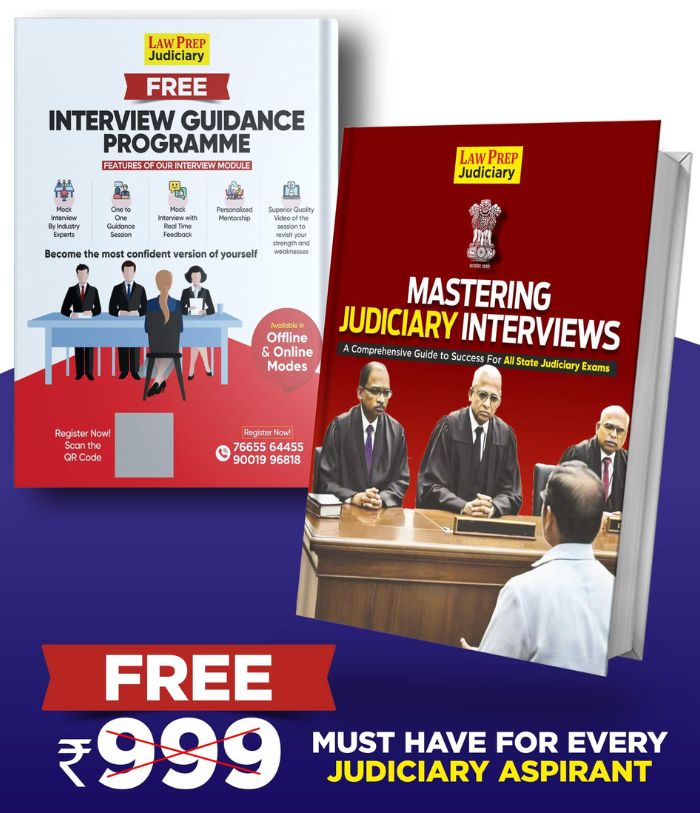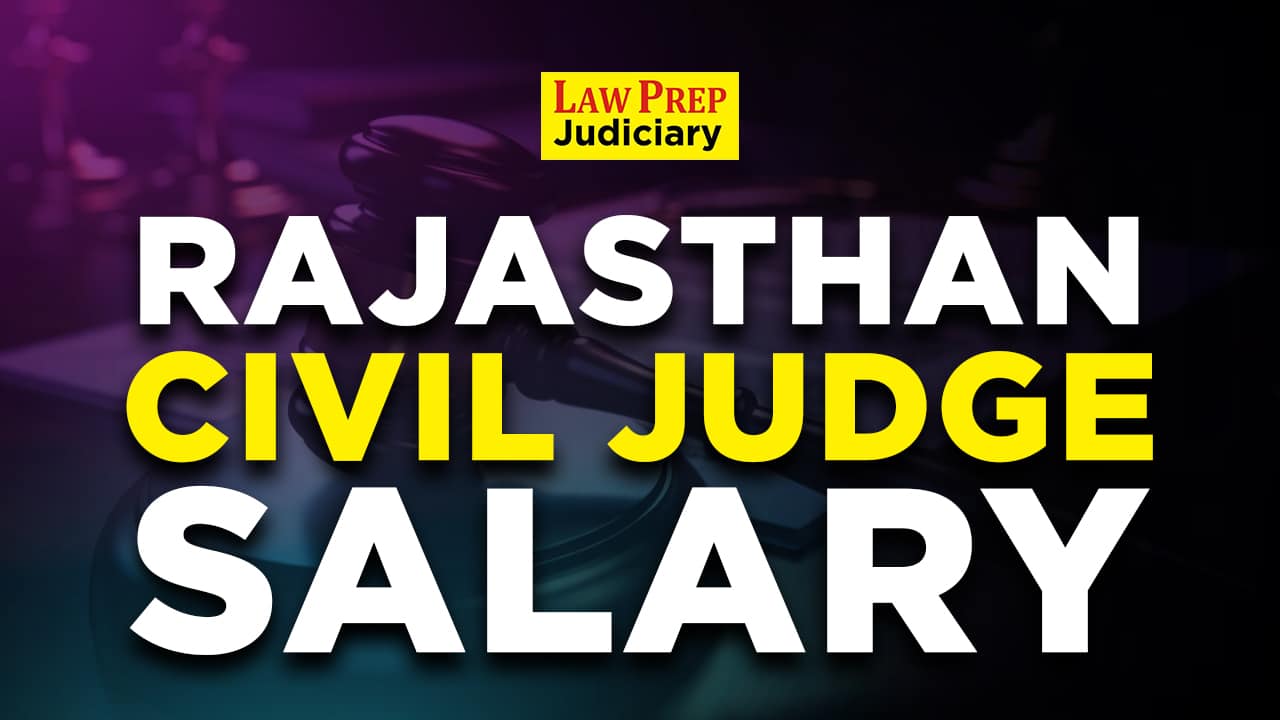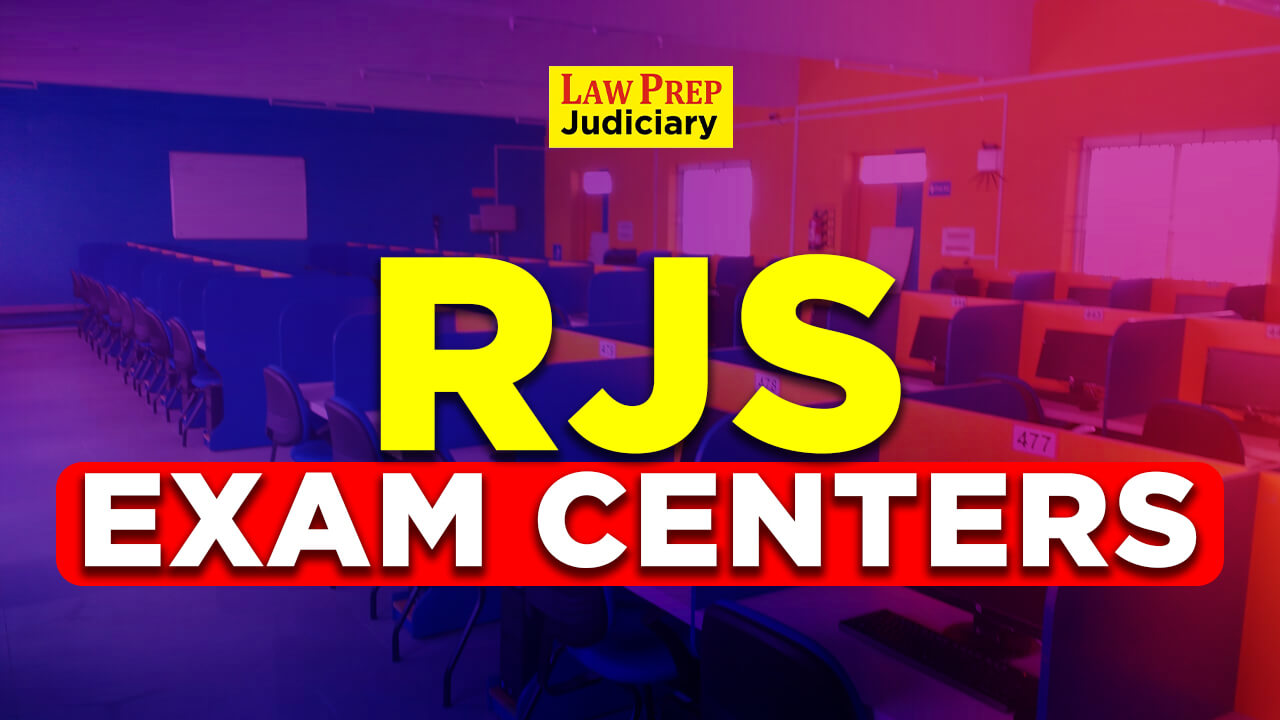The Rajasthan Judiciary Mains exam was held on 31st August and 1st September 2024, and the results will soon be announced along with the interview date. The Rajasthan Judiciary Interview is the final stage of the selection process, where candidates are tested on their legal knowledge, personality, communication skills, and understanding of Rajasthan’s social customs and dialects.
Let’s discuss how to prepare for the RJS interview with expert tips and insights from top faculty and successful candidates, helping you approach the interview with confidence and clarity.
Download Free Copy of ‘Mastering Judiciary Interviews’ eBook Now!

Things You Must Know About Rajasthan Judiciary Interview
1. Comprehensive Evaluation
The Rajasthan Judiciary Interview tests more than just legal knowledge. Candidates are assessed based on their:
- Academic background
- Character
- Personality
- Communication skills.
According to the official RJS 2024 notification, questions may range from academic to general, covering topics like current affairs and present-day problems.
2. Focus on Local Culture of Rajasthan
One key aspect of the RJS interview is the emphasis on Rajasthan’s local culture. Candidates are awarded marks for their proficiency in Rajasthan dialects and knowledge of the state’s social customs.
This means understanding the local language and social issues is important to boost your performance.
3. Marks and Merit Calculation
The marks obtained in the interview will be added to your Mains exam score. The final merit list is based on the combined score.
If two or more candidates secure the same marks, their general suitability and interview performance will determine their ranking. Age is considered as a final tiebreaker if needed.
4. Minimum Marks Requirement
For SC, ST, and Persons with Benchmark Disabilities, a minimum of 35% aggregate marks (written exam and interview) is required to qualify. For others, the minimum required aggregate is 40%.
RJS Interview Marks 2025
The RJS interview carries 35 marks.
To pass the RJS exam, candidates must achieve a minimum aggregate score combining both the written exam and interview:
| Category | RJS Interview Marks | Minimum Passing Marks (Aggregate of Mains + Interview) |
| General Category | 35 | 40% |
| SC, ST, and Persons with Benchmark Disabilities (PwBD) | 35 | 35% |
How to Prepare for RJS Interview?
RJS interview preparation requires a strategic approach that focuses not just on your legal knowledge but also on your overall personality, communication skills, and understanding of Rajasthan’s culture.

Below are essential steps to help you prepare for Rajasthan judiciary effectively:
1. Revise Core Legal Concepts
Focus on the major laws, such as the IPC, CPC, CrPC, and Evidence Act. Make sure you understand key legal principles and recent judgments. Be ready to apply legal knowledge in practical scenarios. Interviewers may ask you to provide solutions to hypothetical legal problems.
2. Work on GK and Current Affairs
Stay updated with the latest national and international news, particularly legal developments and constitutional amendments. Pay special attention to social and legal issues in Rajasthan. The panel may ask questions about current events or problems in the state.
Read newspapers like The Hindu and The Indian Express regularly and refer to judiciary-related magazines for focused preparation.
3. Practice with Mock Interviews
Mock interviews help simulate the actual interview environment, reducing anxiety and improving your response time.
Seek out mock interviews provided by judiciary coaching institutes like Law Prep Judiciary or arrange them with mentors to get feedback on your performance. Practice answering both legal and non-legal questions confidently.
4. Develop Communication and Body Language Skills
Clear and effective communication is key. Practice explaining legal concepts in simple terms. Pay attention to your body language during mock interviews. Maintain eye contact, sit upright, and present yourself with confidence.
Work on listening skills—being an attentive listener can improve your responses during the interview.
5. Improve Proficiency in Rajasthan Dialects and Customs
Your knowledge of Rajasthan’s dialects and social customs will be evaluated in the interview. If you are not fluent in the local dialects, take time to learn the basics.
Study Rajasthan’s cultural and social norms, and be prepared to answer questions about the state’s traditions and customs. Being familiar with these elements can help you score better in the interview.
6. Focus on Personality Development
The interview panel is looking for candidates with a well-rounded personality. Confidence, humility, and emotional intelligence are key traits they assess.
Work on stress management techniques to maintain composure during challenging questions. Showcase your problem-solving skills and ability to think on your feet.
7. Study Ethics and Integrity
Ethics and integrity are critical for a judicial role. Be prepared for questions that test your moral judgment and ethical decision-making.
Practice answering questions about hypothetical ethical dilemmas, demonstrating fairness and honesty in your responses.
8. Prepare for Non-Legal Questions
The interview may include questions on topics unrelated to law, such as your educational background, hobbies, or societal issues.
Be honest and genuine in these answers. The panel is assessing your character and how you handle different situations.
9. Stay Calm and Confident
The interview can be stressful, but staying calm and composed is important. Avoid rushing through your answers; take a moment to think before responding.
Remember, confidence without arrogance is crucial. Present yourself with humility and a positive attitude.
10. Final Preparation
Prepare a list of key points or concepts to revise before the interview. Take care of logistical aspects, such as dressing formally, carrying necessary documents, and reaching the interview venue on time.
Check top RJS Interview Questions.
Related RJS Blogs:
RJS Toppers 2024
Mistakes to Avoid During RJS Interview
To ensure you give your best performance in the Rajasthan Judiciary Interview, it’s important to avoid some common mistakes that can affect your chances. Here are the key mistakes to watch out for:
1. Lack of Preparation
- Mistake: Failing to revise key legal concepts or stay updated on current affairs.
- Solution: Thoroughly revise important laws like IPC, CrPC, CPC, and the Evidence Act. Keep yourself updated with recent judgments and legal developments, and stay informed about current events, especially those related to Rajasthan.
2. Overconfidence or Arrogance
- Mistake: Appearing overly confident or arrogant in your responses.
- Solution: Be confident, but remain humble and respectful. Overconfidence can come across as arrogance, which may leave a negative impression on the panel.
3. Poor Communication Skills
- Mistake: Speaking too fast, being unclear, or using complex jargon unnecessarily.
- Solution: Practice clear, concise communication. Answer questions in a simple and straightforward manner without over-complicating your responses. Good communication also includes listening carefully before responding.
4. Inadequate Knowledge of Rajasthan Dialects and Customs
- Mistake: Ignoring the importance of Rajasthan’s dialects and social customs.
- Solution: The interview may include questions about local dialects and customs. Ensure you have a basic understanding of Rajasthan’s cultural and social landscape. Showing knowledge in this area can positively impact your score.
5. Unprepared for Non-Legal Questions
- Mistake: Being caught off guard by questions unrelated to law, such as personal background, hobbies, or current affairs.
- Solution: Be prepared for general questions about your personal life, educational background, or hobbies. Stay composed and answer honestly without getting flustered.
6. Weak Body Language
- Mistake: Poor posture, lack of eye contact, or fidgeting can signal nervousness or lack of confidence.
- Solution: Maintain good posture, make appropriate eye contact, and avoid fidgeting. Your body language should reflect confidence and attentiveness.
7. Interrupting the Interview Panel
- Mistake: Interrupting or cutting off the interviewers while they’re speaking.
- Solution: Always let the panel finish their questions before responding. Interrupting may come across as disrespectful or impatient.
8. Being Dishonest or Exaggerating
- Mistake: Giving exaggerated or dishonest responses to impress the panel.
- Solution: Always be truthful in your responses. If you don’t know the answer to a question, admit it politely. Honesty is a key trait that the panel values.
9. Failing to Stay Calm Under Pressure
- Mistake: Getting nervous, agitated, or defensive when faced with tough questions.
- Solution: Take a deep breath and stay calm if you’re asked a difficult question. If needed, ask for a moment to think before responding. Handling pressure gracefully is an important quality for a judge.
10. Overlooking Ethics and Integrity
- Mistake: Giving unclear or weak answers when asked about ethical dilemmas.
- Solution: Be prepared to answer questions about ethics and integrity with clear, thoughtful responses. Demonstrate your ability to make fair and honest decisions, as this is a key quality for the judiciary role.
FAQs About RJS Interview
The RJS interview is the final stage of the selection process for the Rajasthan Judicial Services. It assesses not only your legal knowledge but also your personality, communication skills, ethics, general awareness, and understanding of Rajasthan’s social customs and dialects. The interview panel tests your suitability to serve as a judge.
Focus on revising key laws like the IPC, CrPC, CPC, and the Evidence Act. Be ready to explain legal concepts clearly and apply them to practical situations. Studying recent judgments and significant case laws will also help in handling legal questions effectively.
Questions in the RJS interview cover a wide range of topics, including legal knowledge, current affairs, general knowledge, and personal background. You may be asked to explain legal concepts, solve hypothetical legal problems, or share your opinion on social and legal issues. The panel also focuses on your understanding of Rajasthan’s dialects and customs.
General knowledge questions can cover national and international current affairs, legal developments, constitutional amendments, and Rajasthan-specific issues. It is important to stay updated on current events by reading newspapers and judiciary-focused magazines.
Yes, proficiency in Rajasthan dialects and knowledge of social customs can be a part of the interview, and marks are awarded for this. Familiarize yourself with Rajasthan’s language, culture, and traditions to perform well in this area.
Body language plays a crucial role in your interview. Maintain a confident posture, make eye contact, and avoid fidgeting. Positive body language can help you appear calm, confident, and composed.
Dress formally for the interview. For men, a suit or formal shirt with trousers is appropriate. Women should opt for a formal suit, saree, or salwar-kameez. Ensure your outfit is professional and conservative to leave a positive impression.
Practice mock interviews to simulate the real interview environment and reduce anxiety. Focus on breathing exercises and take your time when answering questions. Staying composed under pressure is an important quality for a judge.
Yes, the panel may ask for your opinion on legal or current affairs topics. When answering opinion-based questions, present a balanced view and consider multiple perspectives. Ensure that your answers are reasoned and supported by facts.
Mock interviews provide practice in answering both legal and general questions. They help you develop confidence, improve communication skills, and get constructive feedback on your performance. Mock interviews also help you get comfortable with the interview setting.
The marks obtained in the RJS interview are added to your written exam score. If two candidates secure equal marks, their performance in the interview and overall suitability for service will determine their ranking.
RJS Preparation Resources:




